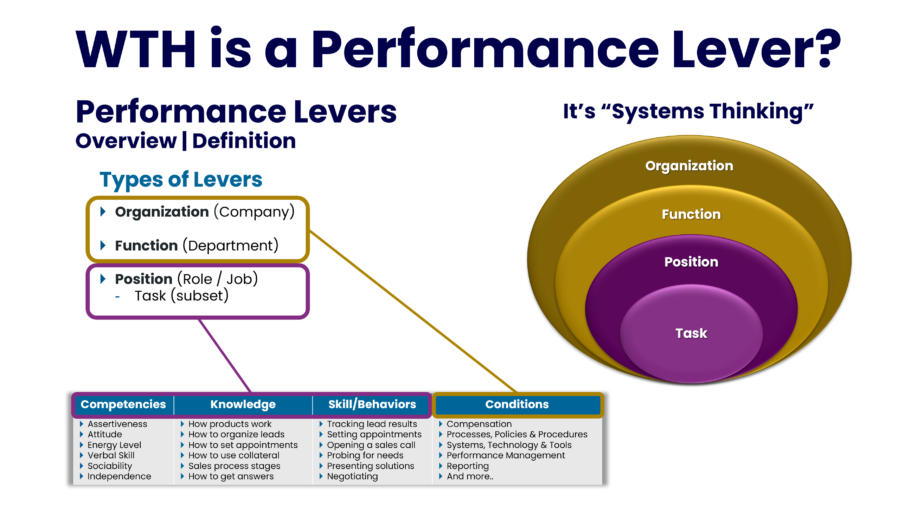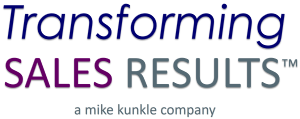WTH is a Performance Lever?

I was asked this question once (and yes, just that way), as I was talking with someone about my work. Performance Levers are central to what I do, and the book that I wrote on sales enablement, as well as The Building Blocks of Sales Enablement Learning Experience, so I thought I’d dedicate a post to the concept.
I came up with this term, Performance Levers, circa 1995. You don’t see it often, but I have seen it used by others now – often to simply mean something that drives performance, or success factors. That’s close, but not exactly it fr.om my perspective Back to that in a moment. First, the origin…
The Origin of Performance Levers
I was working for Hyatt Hotels Corporation in 1995, for Cody Plott, VP of Sales. Frank Calaguire also worked for Cody as his VP of Field Sales. Both are absolutely great guys who were mentors to me in different ways. I respect them both and sincerely appreciate what I learned from them. At the time, we were championing some account development and market management principles which were pretty logical and exciting. As part of that work, Frank was fond of using the term lever, often quoting Archimedes,
“Give me a lever and a place to stand, and I will move the Earth.”
I was very engaged at the time, in learning everything I could about moving from standard training practices to truly improving human performance in the workplace. So, in my head, as you can probably see coming, I had a peanut butter meets chocolate moment. Lever. Performance. Performance Lever. I don’t remember talking about it much at Hyatt and the term seemed esoteric and radical for business leaders at the time, so it mostly hung in my head, with other crusty ideas that often don’t get much airtime.
I think the term hit print for the first time at my work at NovaStar, circa 2003. I was working with a creative instructional designer named Scott Fausett and shared my performance lever concept with him. He turned that into Applied Productivity and Performance Levers (yes, APPLes) in a program we designed together. That was a stroke of brilliance on his part, because the term APPLe stuck, even with execs. I can’t tell you how many times I had to “poker face” a snicker, sitting around a boardroom table hearing senior leaders ask about how someone was doing with their APPLes. Fun times. But, that certainly wouldn’t have worked in every culture.
And for that reason, I still prefer my original “Performance Lever” term and reverted back to it after NovaStar.
Alright Already, WTH Is It?
I have an annoyingly specific definition. Well, it’s annoying to some, anyway, and occasionally even to me. Here it is:
A Performance Lever is any competency, knowledge, skill, behavior or condition that must exist, for ethical, sustained, high performance to occur.
A Concept is Born
Let’s dissect.
Competency:
I wrestle with the term competency, and vacillate between it and characteristics or capabilities. (If you have an opinion, please share.) What I mean, is the stuff inside the person that they bring to the table. It’s a reference to the need to understand a role, what it requires, and the science and art of selection, to match a person’s capabilities to that role. Job fit. If they don’t know everything they need to, or don’t possess every skill they need, they must possess the capability to learn and the willingness to do so. Attitudes and mindset, both central to success, fall in this area. So do the hardwiring and learned behaviors around ethics.
Knowledge | Skill:
This is the stuff people know and what they can do. In the context of delivering well-above-average business results, what must someone know? What skills must they possess? What must they do with that knowledge? And if they don’t know something or have a particular skill, but have the ability to learn (see above), can you close the gap with training, learning and education and reinforce all appropriately?
Behavior:
See http://dictionary.reference.com/browse/behavior. This seems to confuse some people, or maybe I confuse them when I explain it, but I consider this different than “skill.” I’ve heard behavior defined as “anything a dead person can’t do.” To me, in a work context, behavior is skill in action. It’s the use of skills or a series of skills together. Let me offer an example. I have a degree in music. I played trombone and euphonium. Some may debate the level, especially today, but I have the skills required to play the euphonium and once did it pretty well. For a moment, take rusty skills out of the equation. Do I play the euphonium today? No, I sold my last one in 2003. (I still have a trombone and a bass trumpet, and I’m confident you’re excited to know that.) So, I have the skills to play the euphonium, but I do not exhibit the behavior of playing one. I know plenty of people who have the skills to do something at work, or in life, but don’t. Reasons vary, but the end result is the same. Skills, yes. Behavior, no. Make sense? There are also things that I do very well but hate doing. I’m sure you’re the same way.
Condition:
This is a bucket of things. For sales, consider: Is the product viable? Does it meet its intended market’s needs? Is pricing competitive? Does compensation drive and reward the right behaviors? Is it motivating? Do company processes and policies support selling, or is the company in the “sales prevention business?” Does management understand, encourage and support what is being trained? Can they diagnose sales rep behavior relative to the Performance Levers and reinforce training, coach and manage performance accordingly? You might think of this as organization effectiveness work. I think of it as aligning the other supporting organizational and functional Performance Levers, to support the role and task levers for a given position.
Ethical:
I do most of my work in sales environments. I have learned over the years that top 4% (top 20% of the top 20%) is something to be both revered and feared. Why? Because it usually indicates one of two things. Thing one: Exact right wiring for success, doing the exact right things, consistently, with a strong sense of values and servitude. Someone who has “The Right Stuff,” figured out the magic sauce. Thing two: Unethical business practices, working some angle, scamming the system, unethical, immoral and/or illegal activities. Percentages between one and two, fortunately, lean toward number 1, in my experience, but I’ve seen enough of number 2 that as a confirmed cynic, I always try to assume the best but look closely anyway. Or, as I used to tell new managers, trust but verify.
Sustained:
High performance doesn’t do you much good for one day, one week, one month or one quarter, now, does it? Not that I consider one bad day, week, or month the opposite of sustained, but generally, can you keep the level of performance at “high” (and possibly grow it) or not?
High Performance:
This gets stickier, I suppose. To some degree, you’ll need to determine what “high” means in your organization and situation. I generally think in terms of top quartile, top 20%, or wherever the statistical breaks are, using standard deviation. It’s amazing how accurate the old 80/20 rule usually turns out to be. (In a recent study I did, statistically significant groupings occurred at the top of the heap at 7, 14, 25 and 32% – and based on the difference in gaps, I considered everything at 25% or greater to be “high performance.” Top quartile.) My only caveat is that you should reach low enough that you have a prayer of getting your average performers moving in that direction.
Must:
Silly to include this in the definitions of terms? Think again. I put “ethical” in the definition specifically, because I don’t want to assume everyone feels it’s a must, and it’s critical to me. But that aside, I spend a lot of effort deciding what really drives performance or prioritizing those things. What knowledge MUST be present? (NEED to know; not NICE to know.) What skills MUST be possessed? What competencies are REQUIRED and what behavior patterns are MANDATORY for ethical sustained, high performance?
Organizations and roles are often vastly complex, and I know it’s easy to choke on that complexity. For a given position, you could have as many as 9 role-based Performance Levers, with 120 different tasks. And to achieve “ethical, sustained, high performance,” they may all be necessary, but I do try to figure that out, to simplify the complex as much as possible. (Or, as oft-attributed to Einstein: “Make things as simple as possible, but no simpler.”) It’s amazing what some people will tell you is necessary, but when you study top producers, it simply isn’t true. In the early stages of Performance Lever identification, I usually err on the side of inclusion, and pare down and prioritize over time, as I learn through experience and observation, within that specific organization.
Closing Thoughts
Well, that is my definition of Performance Lever. If interested, there’s more at http://slidesha.re/PerfLevers082011. For example, I believe Levers occur at the Organization (Company), Function (Department), Role (Job/Position) and Task level. And in the slides, there is an engine metaphor that oddly seems to resonate for many people. Check it out when you have time.
Thanks for reading, be safe out there, and by all means… let’s continue to elevate our sales profession.
Mike
Follow my work and connect
- The Building Blocks of Sales Enablement Book: https://bit.ly/BBofSE
- The Building Blocks of Sales Enablement Learning Experience: https://www.GoFFWD.com/Blocks/
- SPARXiQ Blog: https://sparxiq.com/author/mikekunkle
- Distribution Strategy Group Blog: https://distributionstrategy.com/author/mike-kunkle/
- Sales Effectiveness Straight Talk Webinars: https://bit.ly/MikeKunkle-OnDemand (60 Free Recorded Webinars)
- LinkedIn Articles: http://bit.ly/MK-LinkedInArticles
- LinkedIn Profile: https://www.linkedin.com/in/mikekunkle
- Twitter: https://twitter.com/mike_kunkle
About Mike
Mike Kunkle is a recognized expert on sales training, sales effectiveness, and sales enablement. He’s spent over 27 years helping companies drive dramatic revenue growth through best-in-class training strategies and proven-effective sales transformation systems – and he’s delivered impressive results for both employers and clients. Mike is the founder of Transforming Sales Results, LLC and works as the Vice President of Sales Effectiveness Services for SPARXiQ, where he designs sales training, delivers workshops, and helps clients improve sales results through a variety of sales effectiveness services. Mike collaborated with Doug Wyatt to develop SPARXiQ’s Modern Sales Foundations™ curriculum and also authored the SPARXiQ’s Sales Coaching Excellence™ course. His book, The Building Blocks of Sales Enablement, is available on Amazon and he collaborated with Felix Krueger to launch The Building Blocks of Sales Enablement Learning Experience.

